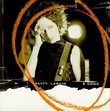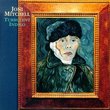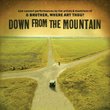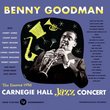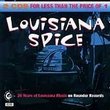| All Artists: Dianne Reeves Title: I Remember Members Wishing: 0 Total Copies: 0 Label: Blue Note Records Original Release Date: 3/26/1991 Release Date: 3/26/1991 Genres: Jazz, Pop, R&B, Broadway & Vocalists Styles: Traditional Jazz & Ragtime, Vocal Jazz, Bebop, Oldies, Vocal Pop, Traditional Vocal Pop Number of Discs: 1 SwapaCD Credits: 1 UPCs: 077779026425, 0077779026456, 077779026449, 077779026456 |
Search - Dianne Reeves :: I Remember
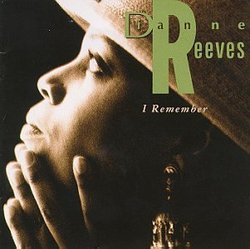 | Dianne Reeves I Remember Genres: Jazz, Pop, R&B, Broadway & Vocalists
|
Larger Image |
CD DetailsSimilarly Requested CDs
|
Member CD ReviewsReviewed on 11/23/2009... While she has a fabulous voice, her style is more 'fluted' (near scat?) than we prefer. I was hoping this was more 'mellow jazz' (like Diana Krall).
If you do prefer old standards done in a more upbeat, updated style, this album is for you. CD ReviewsReeves has "the voice" Rick Cornell | 01/05/1999 (5 out of 5 stars) "dianne reeves must like a challenge. for 1991's "i remember" she selects songs associated with several members of the jazz pantheon: abbey lincoln, billie holiday, ella fitzgerald, sarah vaughan, and miles davis. reeves uses her total musicality to build upon, consolidate, and re-imagine the songs of her predecessors. she ups the "afro" in the lincoln-asociated, "afro blue." lincoln, with then-husband max roach, was part of the first wave of jazz musicians to incorporate african culture (dress, rhythm, politics) into black american jazz not for "jungle" exotica, but to unify the black american fight for civil rights with africa's struggle to overthrow colonialism. reeves appropriately punctuates the ending of "afro blue" (a song which combines the political force of african identification with a sensuous poem of two lovers) with cries that take the listener straight to the continent. cole porter's once-controversial "love for sale" poses interesting challenges to interpreting the holiday and fizgerald recordings that reeves fuses: holiday in the pale of her vocal powers and, surely, the throes of some legendary "my man don't love me" blues, fizgerald at the height of her adult "songbook" fame, yet still possessing that girl "-babe in the woods" voice and persona. shouting a gospel salvo for her introduction lends reeves's "love for sale" an earthiness listeners might not immediately associate with the unflappably cool, literate, and sophisticated prostitute portrayed (in varying ways) by holiday and fitzgerald. for all its energy, reeves' opening must have been near-effortless: her voice shows no signs of over-exertion when she returns for the lightly delivered head statement. in this uptempo portion of the arrangement reeves summons the fragility and detachment of miles davis' trumpet and thereby reconciles holiday's tattered lady-cool with fitzgerald's inexperienced but-cool-braggadocio. in a nod to sass (vaughan), reeves melds two of the divine one's gems by inserting the bridge of "misty" into her second chorus of "the nearness of you." (to give an idea of the challenge associated with vaughan's material, reeves has been quoted as saying that the one time they met, miss vaughan advised reeves never to open for her again.) the bass intro sets the finger poppin pulse; reeves, placed in the vein, swings like a lover's quick and quickening heart. reeves also courageously selected fitzgerald's calling card, "how high the moon." realizing that no one can equal or mimic miss fitzgerald's eight hour scat, breakdown, medley, quote-session, AND reprise, reeves instead molds a different, creep-funky, quarter-note-driven, latin romp.added to this mix are sondheim's poetic "i remember sky", the brazilian standard "like a lover," and mccoy tyner's beautiful ballad "you taught my heart to sing." these songs (with the holiday "in satin" warhorse "for all we know") show the gentle yet direct ballad style reeves employs. on "like a lover," her sonorous voice glides through the verses and then rollicks off kevin eubanks's' guitar in an ecstatic ad-lib duet. "you taught my heart to sing" is stated with simplicity; the lyrics, so aptly fitted to tyner's mood and melody, are sung without the excess drama that would cheapen their sentiment. on "i remember sky" reeves conjures the crispness of paper, sharpness of thumb tacks, and the enigmatic blue quality of the sky. reeves's artistry, expertly supported and enhanced by pianist billy childs, is on full display here.reeves has something to please a wide variety of jazz enthusiasts. she is "the complete package," versatile and confident. her versatility is not the result of indecision as to who she is, but the result of abundant and nearly boundless vocal and emotive ranges.in short, dianne reeves puts on a clinic! easily five stars and more." An Outstanding Set of Standards Rick Cornell | Reno, Nv USA | 02/13/2005 (5 out of 5 stars) "Any album of standards tends to make me raise a skeptical eyebrow. As a good friend of mine recently said to me: "Does the world really need another version of 'Love For Sale'?"
My answer: normally, not really. But in this case, yes. In fact, "Love for Sale" is on this c.d. Ms. Reeves hits 3 emotional tones in the intro to the song alone. Whether purring or roaring, Ms. Reeves can effectively create emotion on a dime. And she likewise breathes new life into "How High the Moon," another old chestnut, by singing it to a funkified Latin beat. Likewise, her cover of the set-ender, "For All We Know", is gorgeous and a reminder that this is really a great song that isn't sung often enough. But what gets me in this set is her covers of obscure standards. IMO, her exquisite version of Stephen Sondheim's "I Remember Sky" is the highlight of the entire album. The Bergmans' "Like a Lover" is nearly that good; and McCoy Tyner's "You Taught My Heart to Sing" is a very sensitive read. A saddening thought about this album: This album was released on Blue Note in 1991, when Dianne Reeves wasn't very well known. If a talented, unknown singer like Ms. Reeves were to approach Blue Note today, this album wouldn't be made (at least not by them). Blue Note has gone for the bucks; they are more interested in Al Green or Van Morrison than in neophyte jazz singers. That's not how it used to be. Albums like this used to be made. Ours is poorer for the loss. RC" |

 Track Listings (9) - Disc #1
Track Listings (9) - Disc #1
